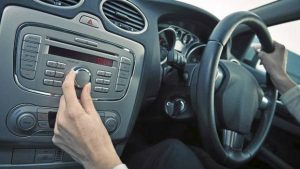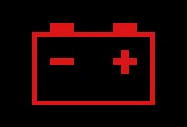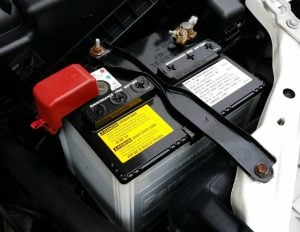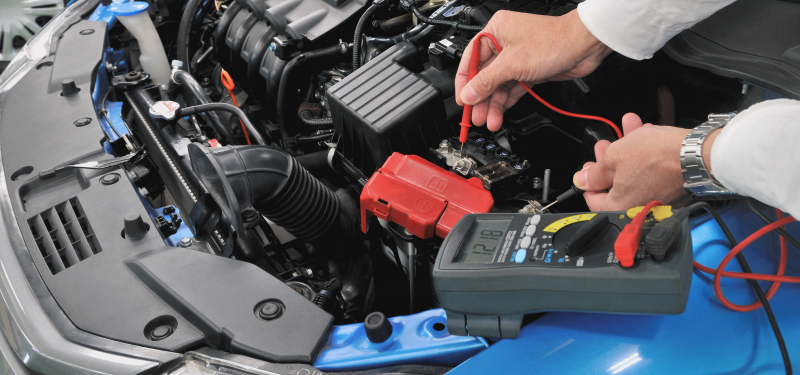Your battery acts as a powerhouse to your vehicle, providing the necessary energy to get your engine running. When a battery is faulty, it can stop your vehicle from starting. Below are a series of common signs that your battery needs replacement.
1. The engine turns over slowly or sluggishly but doesn’t start.
The most common culprit for a car not starting is a dead or faulty battery. The obvious solution to this is jump-starting the car. However, you should avoid letting your battery go flat as this will cause it to lose charge quicker.
If your vehicle is regularly refusing to start, it is probably in need of a new battery. If the battery is not the reason, it may be an electronic fault. Bring your vehicle to a trained mechanic to receive a diagnosis.
A simple way of checking whether your battery is the problem is by doing the following:
- Turn your vehicle’s headlights on.
- Attempt to start the vehicle while monitoring the brightness of the headlights. Listen for the ignition clicking.
- If the headlights become dim or turn off while the car is cranking, your battery is low or flat.
- If the headlights remain at a constant level, it is not the battery causing this problem.
2. The car runs out of power very quickly.

When the car is not running, listening to music, using lights or using your car’s fan depletes the battery’s energy. If your vehicle’s power is running low after short periods of battery use, it may be time for a replacement.
3. The dashboard warning light is on.

Most modern vehicles have a battery warning light on their dashboards. This light will illuminate if there is an internal problem with the battery. This warning light may also mean that there is a problem in your car’s charging system. In this case, it is best to get the warning light diagnosed.
4. Your battery hasn’t been replaced for a while.

Over time, batteries lose their capacity and become less powerful. If you haven’t had your battery replaced in the last 4-5 years, it may be time for a new one.
How long do car batteries last?
The average lifespan of a battery can vary depending on several factors. These include:
- How often the car is used. A car used infrequently will lose charge.
- The level of distilled water present in the battery.
- The status of your car’s charging system.
- How many times the battery has run flat and needed jump-starting.
- How the battery has been stored before use.
How to tell if it’s that battery, alternator, or starter motor that needs replacing
When experiencing issues with your vehicle’s electrical system, such as difficulty starting the engine or a dead battery, it can be challenging to determine whether the problem lies with the battery, alternator, or starter motor. Here are some ways to help identify the culprit:
- Battery Issues:
- Dead Battery: If you turn the key or press the start button, and you hear a clicking sound or nothing happens at all, it may indicate a dead battery. You can try jump-starting the vehicle with jumper cables or a portable jump starter. If the engine starts and runs normally after jump-starting, it suggests a battery problem.
- Dim Lights and Electrical Malfunctions: A weak battery can cause dim headlights, dim interior lights, or malfunctions in electrical components. If you notice these symptoms along with difficulty starting the engine, it may indicate a battery issue.
- Alternator Issues:
- Warning Lights: When the alternator fails, the battery warning light on the dashboard may illuminate. Pay attention to any warning lights indicating a charging system problem, as this could indicate an issue with the alternator.
- Electrical Failures: A faulty alternator can result in various electrical failures, such as dimming or flickering headlights, erratic operation of electrical accessories, or a weak or dead battery despite being fully charged.
- Starter Motor Issues:
- Clicking Sound: If you hear a rapid clicking sound when turning the key or pressing the start button, it may suggest a faulty starter motor. This clicking noise typically indicates that the starter motor is not engaging or is struggling to turn the engine.
- Grinding Noise: A grinding noise during startup could indicate a worn-out starter motor or a faulty starter drive gear.
It’s important to note that these are general guidelines and a proper diagnosis by a qualified mechanic is crucial to determine the exact cause of the problem. For advanced battery and charging system diagnostics and repairs, book your car with Grimmer Motors today

